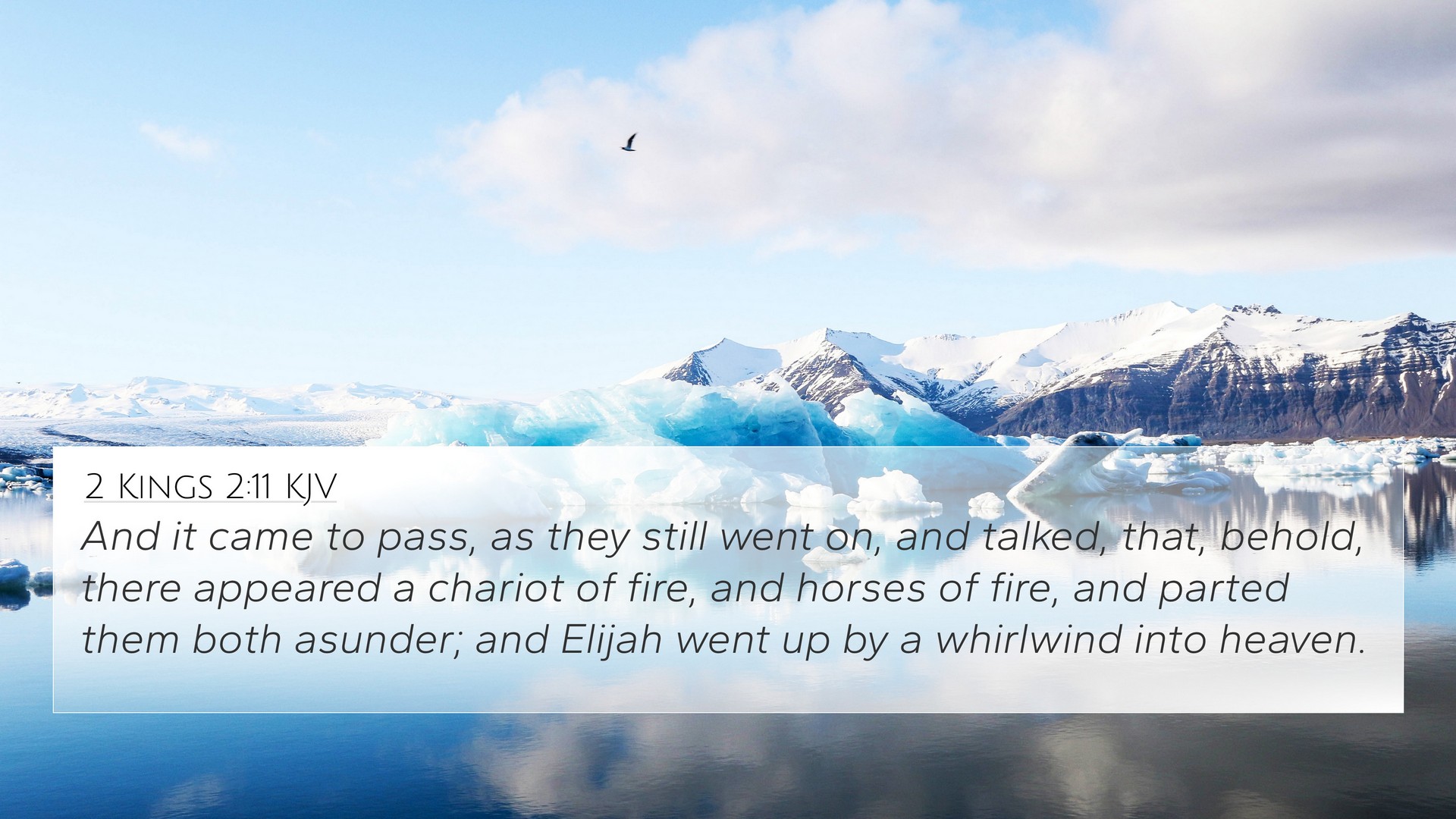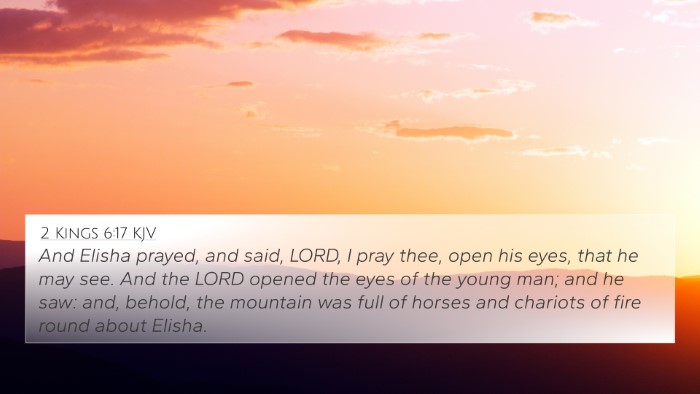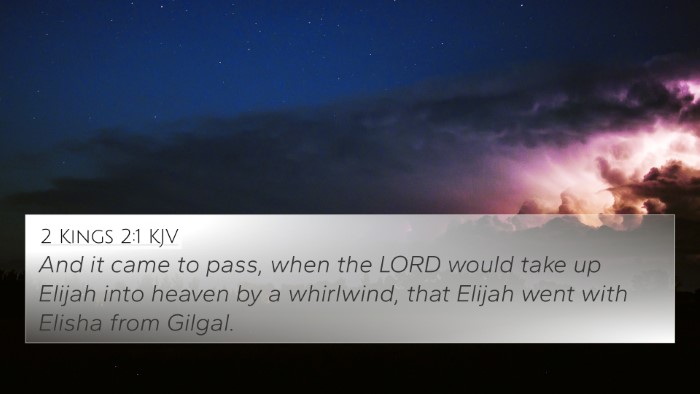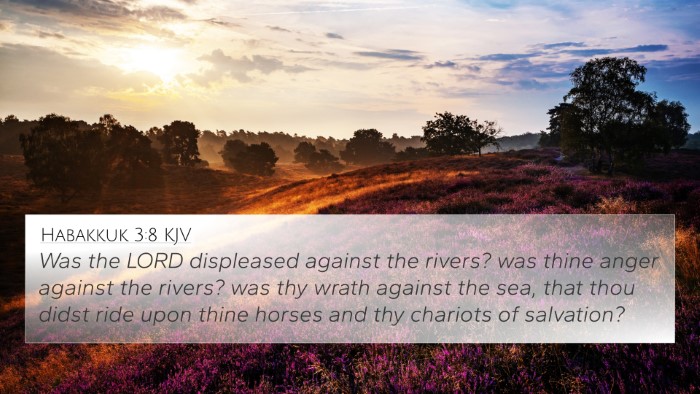Understanding 2 Kings 2:11
Verse: "And it came to pass, as they still went on, and talked, that, behold, there appeared a chariot of fire, and horses of fire, and parted them both asunder; and Elijah went up by a whirlwind into heaven." (2 Kings 2:11)
Summary of Meaning
This verse captures the extraordinary event of Elijah's ascension into heaven, providing a powerful testimony of God's divine presence and power. The imagery of the chariot and horses of fire symbolizes God's majesty and the supernatural nature of Elijah's departure.
Commentary Insights
Matthew Henry's Commentary
Matthew Henry emphasizes the significance of Elijah's translation as a testimony to God's glory and the honor bestowed upon His prophet. He points out the miraculous nature of the event, highlighting that Elijah did not taste death like ordinary men but was taken up in a spectacular manner. This reflects God's sovereignty and favor towards His faithful servants.
Albert Barnes' Notes
Albert Barnes draws attention to the context of Elijah's ministry and his relationship with Elisha. He interprets the whirlwind and chariot as symbols of divine intervention and judgment, indicating that Elijah was being rewarded for his faithful service. Barnes also connects this event to the hope of believers in eternal life, showing a foreshadowing of the resurrection of God's people.
Adam Clarke's Commentary
Adam Clarke provides a detailed analysis of the symbolism present in the ascension of Elijah. He notes the dual aspects of the fiery chariot, representing both the glory of God and the fiery trials faced by Elijah during his ministry. Clarke emphasizes that this divine departure serves as an encouragement for believers to remain steadfast in their faith amidst challenges.
Related Bible Cross-References
- 2 Kings 2:1: The context of Elijah's departure and the prophetic significance of his role.
- Acts 1:9-11: The ascension of Jesus parallels Elijah's and reinforces the theme of divine elevation.
- 1 Kings 19:15-18: The commissioning of Elisha and the continuation of prophetic ministry.
- Matthew 17:1-9: The Transfiguration of Jesus, showcasing a similar divine revelation.
- Hebrews 11:5: Acknowledges Elijah's translation as an act of faith and God's reward for righteousness.
- John 3:13: No one has ascended to heaven except the one who descended from heaven, affirming the uniqueness of these ascensions.
- 2 Peter 1:21: The divine inspiration and prophetic nature of those who speak for God, akin to Elijah’s role.
Thematic Connections
Elijah's ascension provides fertile ground for thematic Bible verse connections highlighting God's sovereignty, prophetic ministry, and the promise of eternal life. Comparative Bible verse analysis reveals parallels between the Old and New Testaments, showing how God's plan unfolds through His chosen instruments.
Tools for Bible Cross-Referencing
When studying the connections between Bible verses such as 2 Kings 2:11, various tools can be employed:
- Utilizing a Bible concordance to locate passages and themes.
- Referring to a Bible cross-reference guide to explore related scriptures.
- Engaging in cross-reference Bible study for deeper insights into themes and doctrines.
Exploring Inter-Biblical Dialogue
This verse serves as an important point within inter-Biblical dialogue, connecting the ministry of the prophets in the Old Testament with the teachings found in the New Testament. The continuity of God's message through different ages underscores the depth and unity of biblical revelation. By examining these connections, believers can enrich their understanding of scripture and appreciate the cohesiveness of God’s plan.
Conclusion
2 Kings 2:11 stands as a pivotal moment in biblical history, portraying the divine affirmation of a prophet's life and work. Through various commentaries and cross-referencing, believers can grasp the profound implications of this event, understanding the nature of God's interactions with humanity and His promises for the faithful. This examination offers a broader appreciation of scripture's interconnectedness and encourages deeper study into the heart of God's Word.














